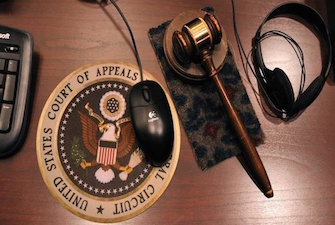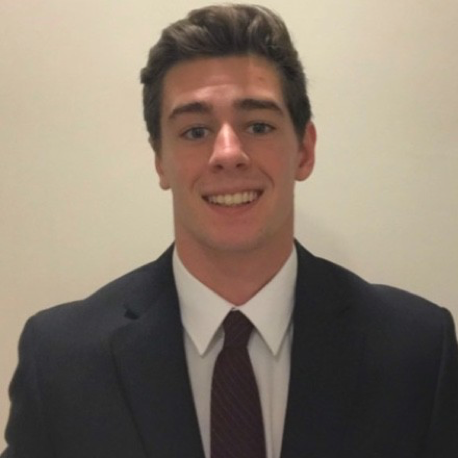“Here…Zinus’s president and expert witness misrepresented his knowledge of highly material prior art. The district court properly declined to condone such conduct.” – CAFC
 On May 5, the U.S. Court of Appeals for the Federal Circuit (CAFC) affirmed the decision of the District Court for the Central District of California to vacate a judgment and injunction for Zinus, Inc., holding the district court did not abuse its discretion.
On May 5, the U.S. Court of Appeals for the Federal Circuit (CAFC) affirmed the decision of the District Court for the Central District of California to vacate a judgment and injunction for Zinus, Inc., holding the district court did not abuse its discretion.
On January 15, 2016, appellee Cap Export, LLC filed a declaratory judgment action against Zinus, the owner of U.S. Patent No. 8,931,123 (“the ‘123 patent”), which claims an assemblable bedframe that can be enclosed in a headboard for shipment, alleging that claims of the ‘123 patent were invalid and not infringed. In response, Zinus filed a counterclaim, alleging infringement of the ‘123 patent and unfair business practices under California state law, and added 4Moda Corp., and Abraham Amouyal, CEO of Cap Export, as third-party defendants. Relying on a declaration filed by Zinus’s then-president and “testifying technical expert,” Colin Lawrie, Zinus filed a motion for partial summary judgment of no invalidity of claims 1 and 3 of the ‘123 patent. On August 29, 2016, the district court noted that in light of the prior art raised by Cap Export, Zinus presented “some testimony” that the patent was valid and granted Cap Export 60 days to depose Lawrie and present an alternative argument. During the deposition, Lawrie denied knowledge of the existence of various prior art items.
On November 29, 2016, the district court sua sponte granted summary judgment invalidating claims 1 and 3 of the ‘123 patent. Zinus appealed, and the CAFC vacated the judgment and remanded, in part because the district court had improperly granted summary judgment of invalidity without proper notice to Zinus and had relied on a prior art reference despite a factual dispute as to whether it predated the ‘123 patent. On September 11, 2018, Zinus filed another motion for partial summary judgment of no invalidity of claims 1,2, and 3 of the ‘123 patent, which was granted on January 24, 2019. Based upon the January 2019 summary judgment decision, Zinus, Cap Export and Abraham Amouyal then stipulated to the entry of a final judgment in favor of Zinus for infringement, which included that claims 1-3 of the ‘123 patent were not invalid, a damage award of $1.1 million to be paid by Cap Export and Amouyal, and a permanent injunction against Cap Export and Amouyal.
New Evidence
Following the entry of the final judgment, Cap Export discovered evidence that the 2016 deposition testimony Lawrie gave had been false with respect to the prior art. This revelation came after Zinus filed a lawsuit against Classic Brands LLC (an unrelated party), also in the Central District of California, alleging patent infringement of the ‘123 patent. In support of a motion to transfer, Classic Brands presented documents that included exhibits consisting of documents regarding beds manufactured by XinShunYang Industry and Trade Company (“XXITC”), a Chinese company. One of the beds allegedly “had all of the components” of the ‘123 patent except “the headboard.” Upon learning of these documents, Cap Export sent company representatives to Malaysia to meet with Woody Furniture representatives, at which time they were provided with a 2012 purchase invoice that predated the September 25, 2013 filing date of the ‘123 patent.
Rule 60(b)(3)
On September 29, 2018, less than a year after the final judgment, Cap Export and Abraham Amouyal filed a motion to vacate the judgment and injunction under Rule 60(b)(3), which provides grounds for relief based on “fraud, misrepresentation, or misconduct by an opposing party.” The primary basis of the fraud and misrepresentation allegations was the statements made by Lawrie in the October 2016 deposition. Lawrie submitted a declaration executed on November 5, 2019, in which he admitted his October 2016 deposition testimony where he stated that he had never seen “a bed that was shipped disassembled in one box was literally incorrect,” but he argued that he did not “intend to answer falsely” because he “meant that he had not seen a bed shipped disassembled in one box with all of the components in the headboard.”
Additionally, the district court conducted an initial hearing on the Rule 60(b)(3) motion and ordered a video deposition to be conducted of Lawrie. During this deposition which took place on November 15, 2019 Lawrie “again acknowledged” that his deposition statements in October 2016 were “literally incorrect,” but that he did not intend to answer falsely. The district court found Lawrie’s explanation to be “wholly implausible” given the fact that counsel for Cap Export specifically distinguished between “a bed that was shipped disassembled in one box” and “a bed shipped disassembled in one box with all of the components in the headboard.” In determining that Lawrie gave false testimony in the October 2016 deposition, the district court also relied on other Woody Furniture documents that showed sales of XXITC beds to sales agents for the Zinus family of companies (Jusama and HQV), including an invoice for Jusama from 2011.
On May 11, 2020, the district court granted the motion to set aside the May 30, 2019, judgment under rule 60(b)(3) and vacated the injunction. The court held that the purchased Woody Furniture beds were “functionally identical in design to the claims in the ‘123 patent” and that Lawrie’s October 2016 deposition testimony “constituted an affirmative misrepresentation.” Zinus then filed a motion for reconsideration which was denied and subsequently appealed the May 2020 order.
The Appeal
The CAFC recognized that the question before them on appeal was whether Lawrie’s misrepresentations supported relief under Rule 60(b)(3). A motion under Rule 60(b)(3) “must be made within a reasonable time,” and “no more than a year after the entry of the judgment order or date of the proceeding.” The motion in this case, satisfied the one-year requirement. Citing Casey, the CAFC noted that “[m]otions for relief from judgment pursuant to Rule 60(b) are addressed to the sound discretion of the district court and will not be reversed absent an abuse of discretion.” Casey v. Albertson’s Inc., 362 F.3d 1254, 1257 (9th Cir. 2004). The CAFC then stated, citing De Saracho, that “[t]o prevail [under Rule 60(b)(3)], the moving party must prove by clear and convincing evidence that the verdict was obtained through fraud, misrepresentation, or other misconduct and the conduct complained of prevented the losing party from fully and fairly presenting the defense.” De Saracho v. Custom Food Mach., Inc., 206 F.3d 874, 880 (9th Cir. 2000).
On appeal, Zinus relied primarily on Ninth Circuit jurisprudence which has held that Rule 60(b)(3) requires “that fraud…not be discoverable by due diligence before or during the proceeding.” Casey, 362 F.3d at 1260. Zinus therefore focused on Cap Export’s so-called “incompetent lawyers” for the adverse consequences they suffered as a result of the fraud. Specifically, Zinus argued that “emails relating to the Woody shipments would have been discovered if Cap Export’s lawyers has exercised due diligence.” The CAFC noted that the Ninth Circuit’s due diligence requirement seemed “questionable” because the text of Rule 60(b)(3) does not mention diligence, and Zinus did not cite to any appellate court decision that adopted this additional requirement. However, the CAFC elected to follow it here and determine what exactly the due diligence requirement mandates. The CAFC recognized that the Ninth Circuit does not elaborate on the due diligence requirement for Rule 60(b)(3), but that cases in other contexts can provide guidance. In other instances, due diligence in discovering fraud does not require investigation unless there is reason to suspect fraud. The CAFC therefore reasoned, citing Solorio, that “the due diligence inquiry is a function of whether [a petitioner] has some indication before filing his initial petition that the alleged exculpatory evidence existed. If he had no reason to investigate [the exculpatory evidence], then he could not have been dilatory in failing to investigate further.” Solorio v. Muniz, 896 F.3d 914, 920 (9th Cir. 2018). The issue is therefore whether a reasonable company in Cap Export’s position would have had reason to suspect fraud. Here, the CAFC held that Cap Export had no reason to suspect Lawrie’s statements were fraudulent and that the district court’s determination that the Ninth Circuit’s due diligence requirement was satisfied was not a clear error.
Zinus also contested whether the misrepresentations were intentional. The district court found it “highly improbable” that Lawrie was unaware of the purchases at issue and the CAFC stated that they saw “no clear error” in the district court’s determination. Lastly, the district court found that the evidence of the purchases of the beds “would have been material to Cap Export’s arguments against the ‘123 patent’s validity.” Zinus contested whether this would “qualify as invalidating prior art.” However, the CAFC reasoned, citing Jones, that “when the case involves withholding of information called for by discovery, the party need not establish the result would have been altered.” Jones v. Aero/Chem Corp. 921 F.2d 875, 870 (9th Cir. 1990).
Quoting from several Supreme Court decisions, the CAFC concluded by noting that patents are predominantly meant to promote the public interest and their monopoly effects therefore must be “kept within their legitimate scope.” The court added: “Here, Lawrie, Zinus’s president and expert witness, misrepresented his knowledge of highly material prior art. The district court properly declined to condone such conduct.”
Accordingly, the CAFC ruled that the district court did not abuse its discretion in granting the motion to vacate the judgment under Rule 60(b)(3).

![[IPWatchdog Logo]](https://ipwatchdog.com/wp-content/themes/IPWatchdog%20-%202023/assets/images/temp/logo-small@2x.png)

![[Advertisement]](https://ipwatchdog.com/wp-content/uploads/2024/04/UnitedLex-May-2-2024-sidebar-700x500-1.jpg)
![[Advertisement]](https://ipwatchdog.com/wp-content/uploads/2024/04/Artificial-Intelligence-2024-REPLAY-sidebar-700x500-corrected.jpg)
![[Advertisement]](https://ipwatchdog.com/wp-content/uploads/2024/04/Patent-Litigation-Masters-2024-sidebar-700x500-1.jpg)

![[Advertisement]](https://ipwatchdog.com/wp-content/uploads/2021/12/WEBINAR-336-x-280-px.png)
![[Advertisement]](https://ipwatchdog.com/wp-content/uploads/2021/12/2021-Patent-Practice-on-Demand-recorded-Feb-2021-336-x-280.jpg)
![[Advertisement]](https://ipwatchdog.com/wp-content/uploads/2021/12/Ad-4-The-Invent-Patent-System™.png)






Join the Discussion
No comments yet.